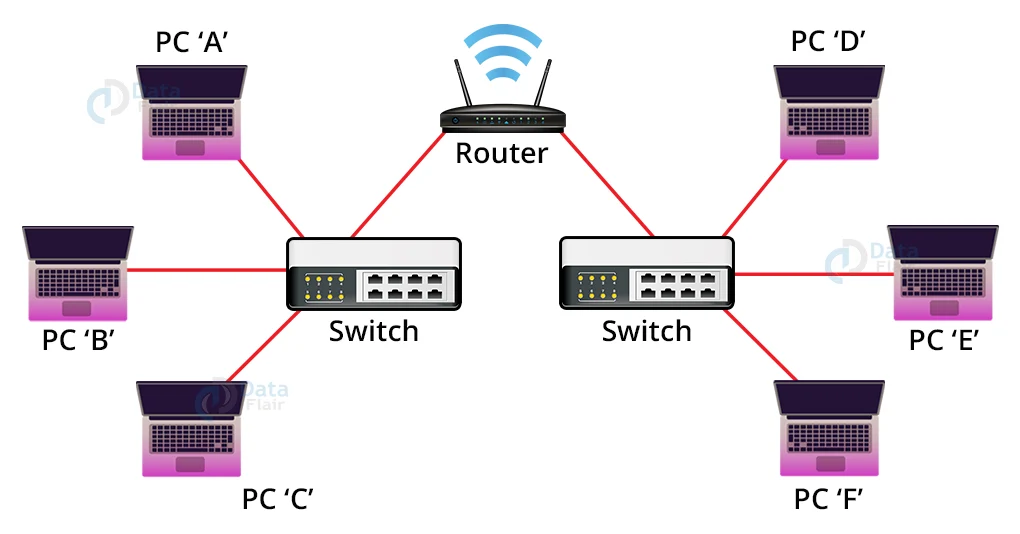ROUTERS
The routers connects the different network segments. It switches the data packets between those network which are either located in the different logical segments or build with the different network protocols.
When a router receive a data packet on any of its interface, it checks the destination address of that packets and based on that destination address, it forwards that data packet from the interface which is connected with the destination address.
To forward a data packet to its destination router keeps the records of connected networks. these record are maintained in a database known as the routing table. Routing table can be built dynamically.
Types of Router
Below are the different types of Router:
1.Wireless Router:- It is present in office, home or railway station, etc. It creates a wireless. Signal Suppose you are in office, we can connect to the internet using wireless signals because your laptop is within the range. We can provide security to routers by entering user id and password. When we try to connect to the router, it will ask for a password and Userid. Userid and password comes along with the device Due to security, no information about the user is harmed. When we visit public places, we can observe that on our phone Wi-Fi window will prop up to use the internet and you can observe that it is secure with a password. Wireless routers are publicly available. N number of users can connect to it.
2. Wired Router:- Name itself defines its meaning. Wire is available to connect to the network. If we visit a bank or small college or office, we can observe that PC or Laptop is connected to the internet using Ethernet cable and that is the wired router. It has a separate wi-Fi access point. If a user wants to connect to the phone then they can use VIOP (voice-over IP technology). There is an ADSL (modem) that has two jacks to connect to ethernet and mobile phones.
3. Edge Router:- It seats at the edge of the backbone of the network and can connect to the core routers. It can be wired or wireless and will distribute into data packets between one or more networks. But it will not distribute internet data packets within networks.
4.Core Router:- It is designed to operate in the internet backbone or core. lt supports multiple telecommunication interfaces of the highest speed and usage in the routing protocol that is used in the core. lt will distribute internet data packets within the network. But core will not distrıbute internet data packets between networks.
Working Of Router
Router provides connectivity for mixed MAC environments by working with higher layer protocols. Hence connection between different network segments viz. ATM and LAN is possible.
Most routers are multiprotocol routers and are capable of handling multiple network layer protocols. To make this possible, router must be equipped with appropriate software for each protocol to be supported. Unlike bridges, routers can intelligently determine most efficient path from source to any destination. To make this possible, various algorithms such as RIP, OSPF, BGP are used as routing protocols.
Uses of Router
Below are the benefits of Router
1. Due to the collision feature, network traffic can be reduced.
2. Due to broadcasting domains, network traffic can be reduced.
3. It provides a MAC address and IP address which will be able to choose the best route across a network.
4. Easy to connect to the wired or wireless network.
5. Highly secured with a password.
6. No loss of information.
7. It can connect to different network architecture such as ethernet cable, Wi-Fi, WLAN
8. Due to the wireless router, it is easy to connect to the internet for a laptop or PC. No need to worry about a bunch of wires.
Advantages of Router
Following are the benefits or advantages of Routers:
1. It provides connection between different network architectures such as ethernet & token ring etc.
2. It can choose best path across the internetwork using dynamic routing algorithms.
3. It can reduce network trafic by creating collision domains and also by creating broadcast domains.
4. It provides sophisticated routing, flow control and traffic isolation.
5. They are configurable which allows network manager to make policy based on routing decisions.
Disadvantages of Routers
Following are the drawbacks or disadvantages of Routers:
1. They operate based on routable network protocols.
2. They are expensive compare to other network devices.
3. Dynamic router communications can cause additional network overhead. This results into less bandwidth for user data.
4. They are slower as they need to analyze data from layer-1 through layer-3.
5. They require considerable amount of initial configurations.
6. They are protocol dependent devices which must understand the protocol they are forwarding.


%20Dual%20Band%20Gigabit%20Wi-Fi%206%20Router.gif?width=778&name=The%20TP-Link%20Archer%20AX50%20(AX3000)%20Dual%20Band%20Gigabit%20Wi-Fi%206%20Router.gif)
Comments
Post a Comment